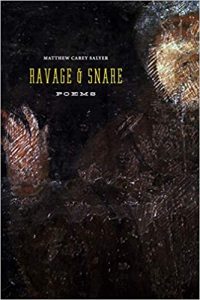Book Review
Hold on to the hanging straps of Mathew Carey Salyer’s collection of poems Ravage & Snare because even though you are on a civilized, modern system of poetic transportation, the language and syntax camouflage twisted rails and sudden dips that will test a reader’s balance at each stop. In the poem “Hudson Line,” for example, the subway is transfigured into a dystopian dreamscape—“Hobbesian, hiving, we clutched the borough’s hem / in blear, implacable as children, as leviathan”—where the cars eat the passengers: “when the northbound comes to fatten its silver bone.”
In the midst of challenging syntax and often elusive meanings, the poems flash real beauty—blooming flowers in the concrete of our daily rituals. In “Brooklyn in Postcards of Soviet Russian Fairy-Tales,” for example, the first couplet just barely elicits a turnstile in winter, but the second charms: “Grandmother, tell me a long word for love so my Father can / die on the quilt of your tongue—will you or won’t you?” These grace notes sound against many nettlesome lines, but their presence does not diminish their impact:
The metaphor’s the self as charioteer,
Overthrown too quickly by the race of life,
But I scan for the bereaved, a husband or wife
Among the cherub crowds, my vital detail.
The poems are muscular with allusion and wordplay, citing sources diverse as Old English poems and Winnie-the-Pooh. The syntax is equally rich, piling adjectives that jar against elusive nouns as if to make a point: the world is complicated and so are attempts to turn experience into meaning. Clarity arises from razor sharp lines like “Girlhood takes practice, like all proper violence” and hides in others:
For what. Words, worlds, both; both
blead as erudite, conjecture their phantom
iterations of the chronotope when
I open the note of my bed for the nether
Lives in mine. Take unconsciousness.
The poems’ erudition can be daunting, and I occasionally felt that if I was a bit more in on the allusion (or the historical, literary, cultural setting), my increased access to the poems would sharpen my appetite. In “Everything is Permitted,” for example, the narrator recalls an old Star Trek episode I just happened to remember from my youth, and consequently the investigation of sexism and boyish desire felt very present to me; without knowing the episode, I’m not sure the poem provides enough context and details for the alchemical transformation to occur. “Two go down and fine, I’m in love: the camphor / loneliness burns between the darling stars / is us,” the poem offers, but if I didn’t know Captain Kirk lusted for the sexy monster, who turns ugly to suck men dry of their salts, I might miss the many echoes of violence in the most beautiful line in the poem: “When she falls, the leads talk / as though they’ve killed the last bison.” We are dropped into a dense coalescence of social tragedies ranging from colonial oppression to male aggression and genocide; as readers, many of us won’t see through the density because we haven’t seen the episode. Consequently, the poem loses some punch. If we don’t know the context, we also won’t know our complicity, and as the narrator points out, we become like Captain Kirk, blameless: “We four without fault.”
The danger of the poems is that their erudition risks excluding those not as learned; the promise of the poems is that their intellectual heft opens up unexpected pleasures: puns and play as well as complex veins of association. Some of the best lines come as a surprise, like a bee sting out of the hum, a sudden sharp pain and recognition you’re surrounded. The poems are layered with difficult syntax and vocabulary; lines rarely feel like conventional sentences, and a reader’s focus is often drawn to the task of untangling—sometimes to point of missing the beauty.
Though many geographies, international and local, appear in the poems, Brooklyn gains mythical status. Not precisely a forge of empires, but certainly a forge of personality and paradigm, a place where one’s mettle is tested. The form is also the sense; the poems as a collection, and the Brooklyn poems especially, wrestle with the idea that poetry is at odds with a gritty, brutish world—and also the same.
Come at me brother.
Let us see who stole whose blood from whom.
Tomorrow is knocking out my teeth from within.
Salyer pounds words and syntax like an opponent in the ring: you will submit to the blows of my intellect, my wit and comprehension. At the end, someone is knocked silly. Someone is flat on the mat.
You may need to take a stool and let the corner medic attend to you after reading “Ravage & Snare,” but scars are often important and remind us of the struggle to find, secure, and cherish beauty. The glorious final two questions of “Hudson Line” challenge us to embrace difficulty: “but what good is loneliness if we must share it? // Whose voice, when I call you, runs late?” Sometimes we get to ravage—perhaps with a poem—but sometimes we are caught in the snare and must wait, trapped on a subway line, to see where we will be taken.
About the Reviewer
Kyle Torke is a teacher of writing and reading, and he has published in every major genre. His most recent books include Sunshine Falls, a collection of nonfiction essays, and Clementine the Rescue Dog children's books.
